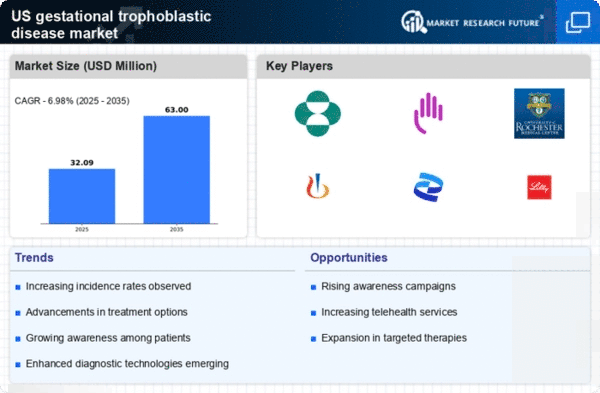Expansion of Healthcare Infrastructure
The gestational trophoblastic-disease market is experiencing growth due to the expansion of healthcare infrastructure in the US. As healthcare facilities improve and increase in number, access to specialized care for gestational trophoblastic disease is likely to enhance. This expansion includes the establishment of dedicated oncology centers and the integration of advanced diagnostic tools, which can facilitate early detection and treatment. Moreover, the growing emphasis on women's health within healthcare policies may lead to increased funding and resources allocated to address conditions like gestational trophoblastic disease. As healthcare systems evolve, they are expected to provide more comprehensive care, which could significantly impact patient outcomes and drive the growth of the gestational trophoblastic-disease market.
Increased Funding for Research Initiatives
The gestational trophoblastic-disease market is benefiting from increased funding for research initiatives aimed at understanding and treating this condition. Government and private organizations are allocating more resources to research, which is crucial for developing new therapies and improving existing treatment protocols. In recent years, funding for cancer research has seen a notable rise, with billions of dollars being invested annually. This influx of capital is likely to accelerate the pace of discovery in the field of gestational trophoblastic disease, leading to innovative treatment options and improved patient care. As research progresses, it may also foster collaborations between academic institutions and pharmaceutical companies, further enhancing the growth potential of the gestational trophoblastic-disease market.
Growing Patient Advocacy and Support Groups
The gestational trophoblastic-disease market is positively impacted by the emergence of patient advocacy and support groups. These organizations play a crucial role in raising awareness about gestational trophoblastic disease, providing education, and offering emotional support to affected individuals. By fostering a community of patients and healthcare professionals, these groups help to disseminate information about treatment options and encourage early diagnosis. Their efforts may lead to increased patient engagement in treatment decisions, which can ultimately improve outcomes. Additionally, as these advocacy groups gain traction, they may influence policy changes and funding allocations, further supporting the growth of the gestational trophoblastic-disease market. The collective voice of these organizations is likely to enhance visibility and understanding of the condition within the healthcare system.
Technological Advancements in Treatment Options
The gestational trophoblastic-disease market is significantly influenced by technological advancements in treatment options. Innovations in chemotherapy and surgical techniques have improved patient outcomes, making treatments more effective and less invasive. For instance, the introduction of targeted therapies has shown promise in treating gestational trophoblastic disease, potentially leading to higher survival rates. Furthermore, the development of minimally invasive surgical procedures has reduced recovery times and hospital stays, which is appealing to patients. As these technologies continue to evolve, they are likely to attract investment and research funding, thereby expanding the market. The integration of advanced technologies into treatment protocols may also enhance the overall efficiency of healthcare delivery in the gestational trophoblastic-disease market.
Rising Incidence of Gestational Trophoblastic Disease
The gestational trophoblastic-disease market is experiencing growth due to an observed increase in the incidence of this condition among women of childbearing age. Recent data indicates that the incidence rate in the US is approximately 1 in 1,000 pregnancies, which suggests a growing need for effective treatment options. This rise in cases is likely to drive demand for specialized healthcare services and products aimed at managing gestational trophoblastic disease. As awareness of this condition increases, healthcare providers are more likely to screen for it, further contributing to the growth of the market. The increasing number of diagnosed cases may lead to a corresponding rise in the development of targeted therapies and innovative treatment modalities, thereby enhancing the overall landscape of the gestational trophoblastic-disease market.
















